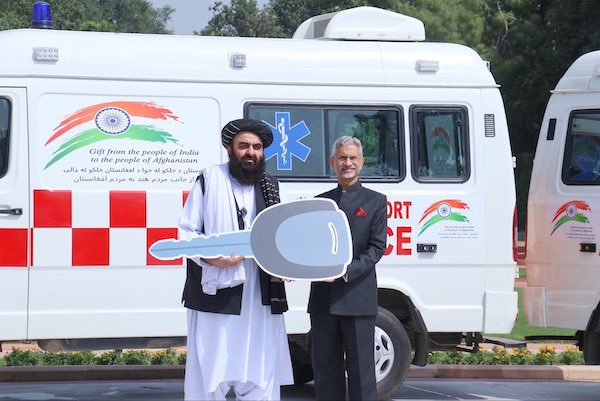
How does a sanctioned individual like Amir Khan Muttaqi, acting foreign minister of the Taliban regime in Afghanistan, fly to India, meet key officials in New Delhi, and even visit the Darul Uloom in Deoband, the Taliban’s ‘spiritual capital’?
The same Muttaqi when invited by Pakistan, could not get the UN Sanctions Committee to approve it. So Islamabad suffered the heartburn of watching the Taliban leader being feted in Delhi.
Diplomats StratNews Global spoke to, said India’s humanitarian work in Afghanistan is acknowledged internationally, so that made the job of the Sanctions Committee easier. India had couched the invitation to Muttaqi in terms of exploring new avenues for providing aid and other assistance to the Afghan population.
Medical help was one, also education and StratNewsGlobal learns that for all the Taliban’s opposition to women’s education, they have raised no objections to India arranging for virtual classrooms where girls could resume schooling.
The US had no objection, more so at a time when it is reportedly engaged in low-profile negotiations with the Taliban to return to Afghanistan. The US has had no dealings with the Taliban since the withdrawal of its forces in 2021 but Donald Trump’s loudly voiced demands for the “return of Bagram”, suggest something is afoot.
On the face of it, the US seems concerned about the presence of so many terrorist outfits in Afghanistan. But the reading is the Taliban is able to control them. Even opium cultivation and production is down, according to the UN Office on Drugs & Crime.
A report released earlier this month said the nationwide ban on opium cultivation imposed by the Taliban in 2022, continues to show results. The area under opium cultivation has dropped from 12,800 hectares to 10,200 hectares, far below the 2,32,000 hectares recorded before the ban.
Opium production dropped to 296 tons with many farmers switching to cereals and other crops. However, worsening drought and low rainfall has left fields barren, and given the economic hardship, illicit cultivation of opium could resume.
But the vagaries of the climate cannot be blamed on the Taliban. By all accounts, the Taliban has shown exemplary behaviour (although Pakistan would disagree). Nor has it risen to Trump’s Bagram bait, refraining from any verbal spats while merely rejecting the US overture.
Nevertheless, negotiations are on, so much is clear and it would seem the US is keen on returning to Afghanistan from where it can keep an eye on Iran, Russia, China and of course Central Asia.
Officially, India has no view on the prospect of the US returning to Afghanistan. What concerns it more is the US-Pak dalliance laced by rare earths and crypto. Is this for real? Does it even have rare earths as it has claimed? if so why has it remained untouched until now? More to the point, how long can this last given Islamabad’s economic situation?
The million dollar concern is if US arms sales to Pakistan resume. This is seen in some quarters in India as inevitable. US arms transfers to Pakistan have a long history and may only embolden, as it has in the past, sundry dictators and generals to engage in more muscle flexing vis a vis India.
In the twisted logic of the generals, every blow directed at India is a victory no matter that Pakistan may end up losing more.
The other concern is Chahbahar port in Iran. The six-month waiver given by the US in October will enable India to continue operations until April next year. Thereafter, unless there is a dramatic breakthrough between Washington and Tehran, the US may insist that India wind up its presence and withdraw.
That would setback India’s operations in Afghanistan since all goods to that country are routed through Chahbahar (the Attari-Wagah border is closed). The air route remains and in fact Afghan agricultural products including dry fruits are presently being flown into India. But anything sent by air comes at a cost.
Will Washington see reason? Much may depend on how the US-Afghan conversation goes. Indian diplomats have noted that Taliban diplomacy is showing sophistication and maturity. Evidence, they believe, that remnants of the old Ashraf Ghani or the Karzai regimes maybe advising the present lot.
Does that also suggest the Taliban may not be as rigid, orthodox and unbending as they are made out to be? Watch this space.
Thirty eight years in journalism, widely travelled, history buff with a preference for Old Monk Rum. Current interest/focus spans China, Technology and Trade. Recent reads: Steven Colls Directorate S and Alexander Frater's Chasing the Monsoon. Netflix/Prime video junkie. Loves animal videos on Facebook. Reluctant tweeter.




